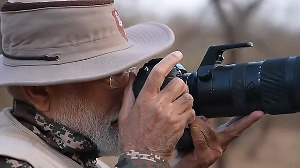Sikkim Krantikari Morcha (SKM) supremo Prem Singh Tamang on Monday took oath as the chief minister of the Himalayan state for the second consecutive term.

The 56-year-old politician was administered the oath of office and secrecy by Governor Lakshman Prasad Acharya at a function held in Paljor Stadium in Gangtok.
Eleven other ministers also took oath along with him.
Thousands of SKM supporters turned up to witness the swearing-in ceremony and cheered for their leader who took oath in Nepali.
The stadium erupted in loud sounds of firecrackers as Tamang was sworn in. The bursting of firecrackers is otherwise prohibited in Sikkim.
Along with the chief minister, 11 other ministers were sworn in, including Sonam Lama, Arun Kumar Upreti, Samdup Lepcha, Bhim Hang Limboo, Bhoj Raj Rai, G T Dhungel, Puran Kumar Gurung, Pintso Namgyal Lepcha, Nar Bahadur Dahal, Raju Basnet and Tshering Thendup Bhutia.
The council of ministers in Sikkim can have a maximum strength of 12 including the chief minister.
While three ministers -- Arun Kumar Upreti, Nar Bahadur Dahal and Raju Basnet -- took oath in Nepali, eight other ministers took oath in English.
Only four ministers of the previous government have been retained time.
The chief minister has rewarded two SKM MLAs Bhoj Raj Rai and Raju Basnet with ministerial berths for defeating Sikkim Democratic Front supremo and former chief minister Pawan Kumar Chamling in Poklok-Kamrang and Namcheybung assembly constituencies respectively.
Tamang also included Nar Bahadur Dahal, a first-time MLA from Khamdong-Singtam, in the cabinet for defeating Mani Kumar Sharma, who had revolted against the chief minister in the previous term.
Women, however, failed to get representation in the Tamang cabinet despite four women getting elected on SKM tickets, including the CM's wife Krishna Kumari Rai.
Around 30,000 SKM leaders and workers attended the elaborate swearing-in ceremony for which the state government had declared a half working day for government employees and closed the educational institutions around the state capital as part of security measures for the function.











 © 2025
© 2025